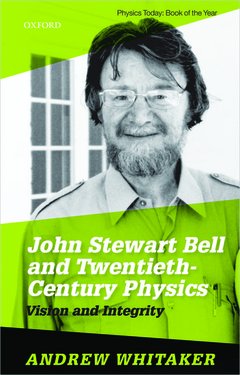Description
John Stewart Bell and Twentieth Century Physics
Vision and Integrity
Author: Whitaker Andrew
Language: English
Subject for John Stewart Bell and Twentieth Century Physics:
Publication date: 01-2020
480 p. · 13.9x21 cm · Paperback
480 p. · 13.9x21 cm · Paperback
Description
/li>Biography
/li>
This book gives a readable non-mathematical account of the upbringing, education and academic achievement of John Stewart Bell, the celebrated physicist from Belfast, who was born in 1928. Bell has become famous for what he described as his 'hobby', analysing the fundamental aspects of quantum theory, where he clarified a long-standing debate between the two most important figures of twentieth century physics, Albert Einstein and Niels Bohr, and showed that, contrary to belief over the previous thirty years, quantum theory could be supplemented with extra 'hidden variables'. His crucial 'Bell's Theorem' or 'Bell's Inequalities' demonstrated a contradiction between quantum theory and local causality. This relation has been tested with increasing rigour over the next years, and quantum theory has triumphed. His ideas were also important in the development of quantum information theory, which covers quantum computation, quantum cryptography and quantum teleportation. The book covers his earlier work at Harwell, where he worked on the design of accelerators, making extremely important contributions to the physics of strong focussing. He later moved to CERN in Geneva where he carried out highly significant work in the fields of elementary particles and quantum field theory. It also covers some details of Bell's personal life, including his marriage while he was at Harwell to Mary Ross, who also worked in the physics of accelerators, and also describes his career decade by decade, and sums up his importance to twentieth-century physics.
Andrew Whitaker was awarded a BA in Theoretical Physics from the University of Oxford in 1967 and a PhD in the theory of nuclear magnetic resonance from the University of Nottingham in 1971. He lectured and carried out research at the University of Ulster until 1988, and since then at Queen's University Belfast, where he became a Professor in 1999. Much of his work over the last thirty years has been in the fundamental aspects of quantum theory, in particular the quantum Zeno effect and aspects of Bell's Theorem. He also has an interest in the history of science and has co-edited volumes on Kelvin, Maxwell and physicists of Ireland.
© 2024 LAVOISIER S.A.S.

